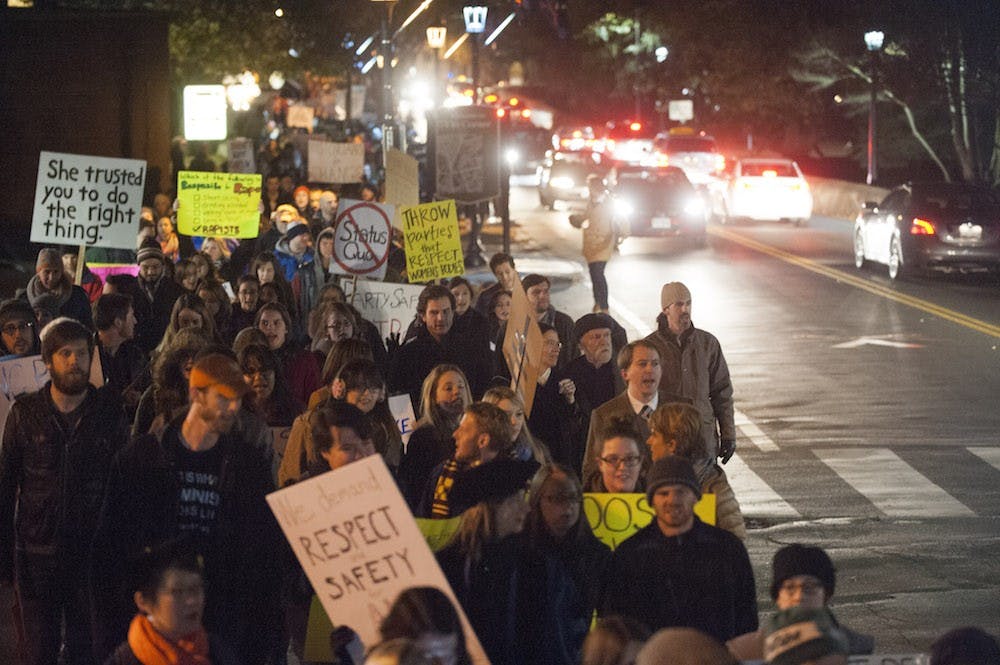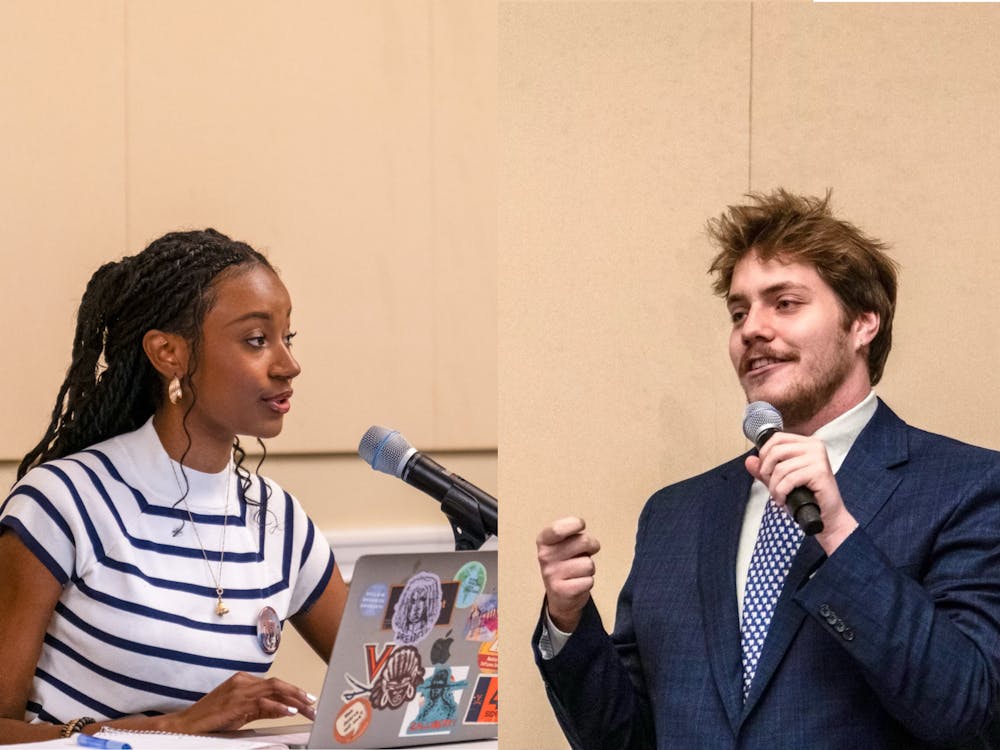Holding signs and chanting, hundreds of faculty members, graduate instructors, staff and students gathered at Beta Bridge for the “Take Back the Party: End Rape Now!” rally Saturday night. Rally members marched down Rugby Road to the Corner and back before ending the event outside the Phi Kappa Psi fraternity house.
The rally is part of a series of responses by the University community to the Rolling Stone article published last week alleging a brutal gang rape at a Phi Kappa Psi fraternity party in Sept. 2012. A press release by rally organizers said it was held in response to ongoing problems of sexual violence at the University.
“We’re here because we think there’s an ongoing problem with social life at U.Va.,” said English Prof. Susan Fraiman, one of the main organizers of the rally. “It is centered on fraternities and as a result, men control who enters parties and women are not on their own turf.”
The event was intended to protest a culture that puts female students at risk, according to a press release.
“We are not here to shut down the party," the press release said. "We are here to support a SAFE social environment for women as well as men. This is a FACULTY action demanding an end to sexual assault at U.Va.”
Professors from a number of departments attended and were instructed to bring signs, wear academic regalia and bring drums, noisemakers, lights and other props.
“I’ve taught here a long time," Fraiman said. "This is the first time, on a cold Saturday night after a football game, I’ve been here on Rugby Road. Usually in terms of speaking with our students and being concerned with their lives, we stick to intellectual conversation in the classroom. But this is something of enormous importance, so we wanted to be out here on the street. We wanted to make a statement as faculty, to say that sexual violence against women will not be tolerated.”
In addition to marching down Rugby Road, rallyists painted both sides of Beta Bridge with the words “Take Back the Party: End Rape!” As they marched, attendees shouted a series of chants, including:
"What do we want?
An end to rape!
When do we want it?
Now!"
and
"Hey Hey, ho ho
Sexual assault
Has got to go!
Hey Hey, ho ho
Yes means yes,
No means no!"
At the end of the rally attendees gathered in front of the Phi Kappa Psi house and listened to a series of professors, students and survivors share personal anecdotes and demand change at the University.
Spanish Prof. Ricardo Padrón, an ‘89 College graduate and former chair of the Faculty Senate, said the rally was organized to demonstrate to administrators that the issues brought up in the Rolling Stone article are important to the entire University community.
“I think it’s very important for faculty and instructors to stand up and support students who have been victims and could be victims,” Padrón said. “And [to] call upon the administration to make real change that will have a real impact on student culture, so that this sort of thing doesn’t happen anymore.”
Many professors expressed disappointment that though rape and sexual violence have been prevalent on Grounds for many years, no collective action has been taken so far.
“It’s shocking," English Prof. and Poet Laureate Rita Dove said. "It’s shocking that nothing has been done. It’s shocking that it took an article by the Rolling Stone in order to get this started. I think many faculty members are strongly shocked at the level to which the administration has kept this quiet.”
English Assoc. Prof. Victoria Olwell, another organizer of the rally and an ‘89 College graduate, said the culture prevalent on Grounds today is similar to the one she experienced as an undergraduate student at the University.
“I see a great deal of continuity between the hostile, sexual environment I experienced as an undergraduate and what I see today,” she said. “And what I see is that this is not going to change by itself, that we’re going to have to work to change rape culture at U.Va.”
English Prof. Herbert Tucker said change, though necessary, was likely to be slow.
“Rape culture is the kind of culture that flourishes in the dark,” Tucker said. “Its eradication will be slow, hard, long term work. What U.Va. can do is keep the issue alive for debate and discussion. Creating a culture of discussion where we’re not afraid to talk about these things is probably the most important thing a place like an university could do.”
American Studies Prof. Lisa Goff said the support of the University administration was necessary for any change to be effective.
“The status quo is not sufficient and has to change [along with] the culture in which a young woman is ostracized for reporting sexual abuse,” Goff said. “Professors want to support students. But the administration, the faculty and the institution of the University of Virginia has to support that, or change cannot happen.”
Fraiman, Olwell and Tucker all called upon action from University President Teresa Sullivan, the Board of Visitors and other levels of administration.
“[The highest levels of administration] have to avoid the appearance of trying to circle the wagons," Olwell said. "They have to avoid the appearance of trying to save their reputation. And they have to take actions that are bold and that are risky to this university’s reputation as a place immune to scandal, in order to effect change in decisive and long-standing ways.”
A resolution was sent by English Department Chair Cynthia Wall to Sullivan, Provost John Simon, College Dean Ian Baucom and Board of Visitors members Saturday afternoon. Approved unanimously by the English Department faculty, the resolution cited “indignation at the Rector's appointment, as independent counsel, of an attorney patently exposed to charges of conflict-of-interest.”
“We therefore have resolved, at a faculty meeting today, to censure as inadequate the University's public pronouncements in the matter," the resolution read. "That the appointment was swiftly rescinded does not remove our concern that failure openly to address criminal patterns of sexual abuse at the University will obscure a set of issues that stand in immediate need of forthright discussion among the faculty and across the community."
By the time the letter was sent, Sullivan had suspended all fraternal organizations and associated social activities until Jan. 9.
“[Banning of fraternal organizations] was the kind of response a lot of us were looking for right off the bat," Tucker said. "Will it put a stop to rape? No. [But] discountenance with the sponsoring of activities of fraternities that seem to have harbored and sheltered the grossest kinds of violence — that’s a good thing.”
Fraiman said the Rolling Stone article was ultimately for the benefit of the University, allowing community members to advance a dialogue about how to combat rape culture.
“I would love to see [the University] become a model," she said. "I know that some students worry that this kind of publicity makes U.Va. look bad. In fact, we have the opportunity to look good if we respond in the right way to this. We can really be in the forefront of addressing this problem."
Fifth-year Batten student Carl David Goette-Luciak, who attended the rally, said the University administration's first step was to realize its policies and procedures have failed.
“Go back to the drawing board and listen to all of these student voices that are pouring out right now, with thoughts, concerns, demands and issues,” Goette-Luciak said. “The most important thing for President Sullivan and the Board of Visitors right now is to listen to the outpouring of voices from students.”






